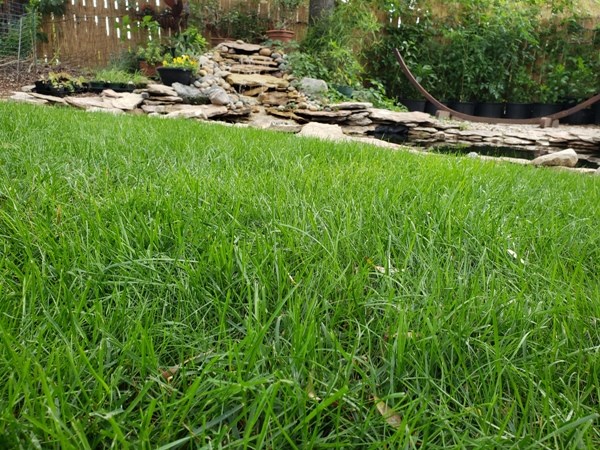The summer season is evidently waning when there is a deep buildup of condensation on the car windows in the morning; the dew on the lawn gets heavy and the wasps begin to come out with gusto. Other subtler indications are happening as well. By mid-August woody ornamentals and perennials are beginning to prepare for winter.
Although it seems hard to believe and rather a bit depressing – ‘tis life and no man, woman or creative gardener will change the seasons or time, leaving, of course the only alternative to be running away when it gets too cold.
So what about the lawn? What should you be doing now to ensure a green lush growth in spring and summer next year? It may be hard to believe but fall is the absolute best time to care for your lawn. Controlling weeds, fertilizing, renovation and even seeding of lawns is easier and more successful beginning right about now for the next number of weeks.
The best fertilizers for fall care are either slow-release or controlled-release fertilizers or other organic alternatives. (Note organic fertilizers are generally a bit more expensive and contain less nutrients than commercially prepared slow-release alternatives.) If you are unsure of what to purchase, ensure you go to your favourite garden centre or garden supply store to have the assistance of trained and knowledgeable personnel. Commercially prepared slow-release fertilizers may be in the form of ureaform, sulfur-coated urea, milorganite and IBDU. All of these forms will stimulate even or uniform growth over a period of time and will be far less likely to burn the grass. They will not exhibit that quick green-up that fast-release formulations show but will give you a healthier lawn for the long term. Ensure to follow the guidelines for application that are clearly displayed on the label.
If this summer your lawn got a bit weed infested, then now is for sure the best time to deal with those pesky things. Don’t give in – keep weeding until freeze-up to ensure good control. If you decide that you need to apply a herbicide then you will have a better effect. Like all perennial plants the weeds are also preparing for winter by sending nutrients and starches to the root zone for storage over the winter. When plants are actively doing this, they will also draw more herbicides into their root systems which will give more effective control.
Eradication of all perennial weeds is essential to the health of your lawn. Avoid products like weed and seed as they are not considered to be an effective method of weed control or fertilization. If your lawn has lots of weeds, then it is likely not a really healthy lawn as a healthy lawn can actually choke out weeds. If your lawn does not have the ability to choke out weeds on its own merit, then you, the gardener, need to lend a helping hand.
From mid- August on, grass will grow rapidly with the cooling of temperatures and the reduced competition of germinating weeds. Renovation, seeding or overseeding at this time is ideal. Proper soil preparation is essential for a healthy lawn. Ideally, soil should be tilled to at least 15 centimetres depth while working in a good source of organic matter. After tilling, smooth with rake and pack firmly. Seed areas with a good quality grass seed and keep adequately moist for six weeks.
So, although it is August, do not yet give up on the garden.
Hanbidge is the lead horticulturist with Orchid Horticulture. Find us at ; by email at [email protected]; on facebook @orchidhort and on instagram at #orchidhort.
Tune into GROW Live, weekly on our facebook page or check out the channel GROW on youtube.





